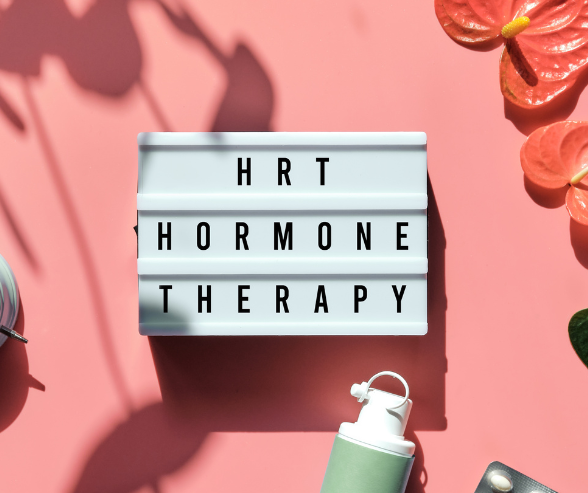As someone who has spent decades in the field of menopause care, let me start by saying this: menopause treatment is not a one-size-fits-all scenario. If only there were a magic solution that worked for every woman, every time! Unfortunately, hormones are complicated creatures, and what works wonders for one person might do absolutely nothing for another. So, if you’re trying to decide if Hormone Replacement Therapy (HRT) is the right treatment for you, then you’ve come to the right place.
I’ve seen hundreds, if not thousands, of women walk through my door, each with their own unique story of how menopause is affecting them. Some have suffered in isolation for years, enduring hot flushes, sleepless nights, and mood swings that frighten the even the bravest among us. Others arrive armed a bit more informed and come right out to ask about HRT.
Either way, my answer is always the same: every woman is different, and we need to do what’s best for you. So, let’s delve a little deeper.
What Exactly Is HRT?
First, a quick crash course for the uninitiated. Hormone Replacement Therapy (HRT) is a treatment for Menopause that supplements the hormones your body is not producing as much of during menopause—mainly oestrogen and sometimes progesterone. These hormones can help relieve many of the most common menopause symptoms, like hot flushes, night sweats, and vaginal dryness, while also protecting your bones and heart health.
Sounds like a dream, right? Well, it can be. But like any medical treatment, it’s not for everyone.
Who Benefits Most from HRT?
In my experience, HRT is particularly effective for women who are struggling with moderate to severe symptoms of menopause. If your hot flushes feel more like spontaneous combustion, or you’ve forgotten what a good night’s sleep even looks like, HRT could be a game-changer for you.
Some women find that HRT not only helps with their physical symptoms but also with the emotional rollercoaster. Let’s be real, when your hormones are all over the place, it’s not just your body that feels out of sync—it’s your mood too. If your temper is shorter than ever, or if the smallest things are setting you off, HRT might help to level things out.
But What About the Risks?
Ah, the dreaded risks. Yes, we’ve all heard about them, and yes, they’re important to consider. Like most treatments, HRT has potential side effects. In the early 2000s, a few studies scared everyone off by suggesting a link between HRT and an increased risk of breast cancer and heart disease. While it’s true that HRT isn’t completely without risk, more recent research has shown that for most women, especially those under 60 or within 10 years of menopause, the benefits often outweigh the risks.
That said, if have a history of breast cancer, blood clots, or certain other conditions, HRT might not be for you. And this is where the experience of your clinician comes to the fore. It’s the clinician’s job to weigh up the pros and cons and consider these based on your individual specific medical history and symptoms. This advice is to help you make an informed decision about your treatment in light of the risks and benefits.
When Lifestyle Changes Aren’t Enough
Many women come to me after already trying to manage their symptoms with a few simple lifestyle adjustments—diet, exercise, yoga, cutting out caffeine, and so on. These are all great first steps to try and can make a huge difference to your symptoms. Personally, I’m a huge advocate for these methods because even if you’re on HRT, staying active and eating well are still essential parts of managing your menopause and conserving your long-term health.
But let’s be honest: for some women, no amount of herbal tea or deep breathing will make the hot flushes or night sweats disappear. That’s when it’s time to talk about medicinal options (aka HRT). It’s perfectly okay to need more than just lifestyle changes. After all, you wouldn’t try to fix a broken leg with a green smoothie, right?
So, Is HRT Right for You?
At the end of the day, the decision to start HRT is a personal one, and it’s one you should make in conjunction with a clinician you trust. Sit down together, look at your symptoms, your medical history, and your personal preferences, and come up with a treatment plan that makes sense for you.
There’s no universal answer to menopause, but there is a way forward—whether it’s HRT, lifestyle changes, or a combination of the two. And if you’re feeling overwhelmed, remember this: you’re not alone.
And hey, even if your hormones are throwing a tantrum, that doesn’t mean you have to let them run the show. You’ve got options—and that’s the best part.
Final Thoughts
If you’re struggling with menopause symptoms and wondering if HRT is the right choice, then my advice is to seek advice from a professional. An HRT specialist clinician can help you through the process and help you find the best treatment for your unique situation.
Remember, you’re not powerless in this. You are a strong, capable woman. Menopause doesn’t have to rule your life. You have options and we can navigate this together.

